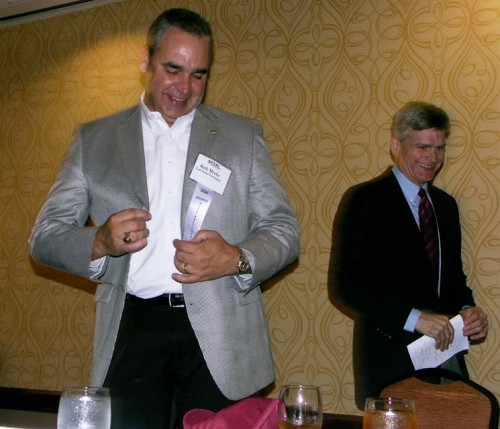
Cassidy: Louisiana has answers for nation’s woes
May 31, 2011Katherine Newsom
June 2, 2011A great movie that came out several years ago was called “Amadeus.”
Amadeus is the middle name of Wolfgang Amadeus Mozart. The name Amadeus in Latin means “lover of God.” The story is told through the eyes of the Italian composer Antonio Salieri.
Salieri’s one desire was to join the great Italian composers of the past whose music glorified God.
As a young boy of 16, he went to church and made a bargain with God. He prayed that God would make him a great composer and, in return, he would strive to live a life of virtue. He promised God, “I will honor you with much music all the days of my life!”
Salieri felt God had accepted his prayer-bargain. He believed that God was telling him, “Bene. Go forth, Antonio. Serve me and humankind and you will be blessed.”
“Grazie,” he replied, “I am your servant for life.”
Shortly afterward he met the Emperor who gave him a job. He took this as a sign that God accepted his bargain. Salieri became a respectable composer.
Then he meets Mozart.
In their first encounter, Mozart was rolling around on the floor with Constanze, a lady of the court, when he was supposed to be giving a concert for the emperor.
When Salieri hears Mozart play, he said, “I was suddenly frightened. It seemed to me that I had heard a voice of God and that it issued from a creature whose own voice I had also heard and it was the voice of an obscene child.”
Salieri doesn’t understand what is happening. He dedicated his whole life to God and can only produce satisfactory work. Then Mozart comes along and produces exquisite music yet his personal life is far from virtuous.
For Salieri, Mozart was the “Imago Dei,” the manifestation of God in music.
Through Mozart’s music, God’s glory was clearly evident.
To Salieri, this was not fair. He had worked hard and dedicated his whole life to God. Yet God manifested his glory through Mozart and not him. So he declares war on God.
In Salieri’s own words, “My life acquired a terrible and thrilling purpose: the blocking of God in one of his purest manifestations. I had the power. God needed Mozart to let himself in the world, and Mozart needed me to get him worldly advancement. So it would be a battle to the end, and Mozart was the battleground.”
The rest of the story is the battle.
In John’s gospel, Jesus tells Philip and all of us that he is the “Imago Dei.”
He says, “Whoever has seen me has seen the Father.” Those are powerful words, especially when we understand the Jewish mentality about God. Scripture scholar William Barclay says, “It may be to the ancient world that this was the most staggering thing Jesus ever said.”
Yes, Jesus is the ultimate “Magnification of God.” Yet, in a real way all of us are Imagoes Dei. The Book Genesis proclaims that we are made after the image and likeness of God. That means in some way we reflect the beauty and splendor of God, not like a Mozart or even a Salieri, but in our own particular way with our own particular gifts and talents.
Not only are we made after the image and likeness of God, but we are called to become more like God by imitating the life of Jesus. Jesus said, “I am the way, and the truth, and the life.”
He taught us to love unconditionally, to stand us for the truth, to plug into the power of the Holy Spirit. Let us reflect the goodness and love of God in our lives by allowing the Almighty’s glory to shine through us.








